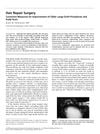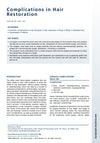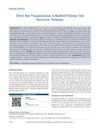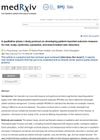 11 citations,
July 1999 in “Dermatologic Surgery”
11 citations,
July 1999 in “Dermatologic Surgery” Corrective hair repair surgery can significantly improve appearance and quality of life for patients with unsatisfactory results from old hair transplants.
 December 2024 in “Medical Review”
December 2024 in “Medical Review” Organoids help study and treat genetic diseases, offering personalized medicine and therapy testing.
45 citations,
June 2003 in “Journal of Investigative Dermatology Symposium Proceedings” Understanding hair follicles through various models can help develop new treatments for hair disorders.
 13 citations,
January 2016 in “Journal of the Egyptian Women's Dermatologic Society (Print)”
13 citations,
January 2016 in “Journal of the Egyptian Women's Dermatologic Society (Print)” Minoxidil works faster and is more cost-effective for treating hair loss, but platelet-rich plasma microneedling can be an alternative for those who can't use minoxidil.
 14 citations,
November 2013 in “Facial Plastic Surgery Clinics of North America”
14 citations,
November 2013 in “Facial Plastic Surgery Clinics of North America” Hair transplant complications can be avoided with proper training and understanding.
 15 citations,
January 2013 in “Journal of Cutaneous and Aesthetic Surgery”
15 citations,
January 2013 in “Journal of Cutaneous and Aesthetic Surgery” The modified Direct Hair Transplantation method is effective for treating baldness with better graft survival and less damage than standard techniques.
 39 citations,
June 2013 in “Journal of Cosmetic Dermatology”
39 citations,
June 2013 in “Journal of Cosmetic Dermatology” Herbal extracts and platelet-rich plasma together may help increase hair growth by making certain cells grow more, through specific cell growth pathways.
 72 citations,
December 1996 in “Journal of Investigative Dermatology”
72 citations,
December 1996 in “Journal of Investigative Dermatology” Human hair follicles can regenerate after removal, but with low success rate.
 4 citations,
January 2022 in “Life”
4 citations,
January 2022 in “Life” Tissue engineering could be a future solution for hair loss, but it's currently expensive, complex, and hard to apply in real-world treatments.
 June 2020 in “Applied sciences”
June 2020 in “Applied sciences” A new semi-automatic hair implanter could make hair transplants easier, more successful, and more accessible.
June 2021 in “Cosmoderma” Hair transplantation techniques have improved, making the process safer and more effective with less visible scarring.
 August 2003 in “International Journal of Cosmetic Surgery and Aesthetic Dermatology”
August 2003 in “International Journal of Cosmetic Surgery and Aesthetic Dermatology” Fiber implants effectively treat permanent hair loss with few complications.
 3 citations,
August 2003 in “International Journal of Cosmetic Surgery and Aesthetic Dermatology”
3 citations,
August 2003 in “International Journal of Cosmetic Surgery and Aesthetic Dermatology” Fiber implants effectively treat permanent hair loss with over 85% success and minimal complications.
 68 citations,
December 1991 in “Annals of the New York Academy of Sciences”
68 citations,
December 1991 in “Annals of the New York Academy of Sciences” Hair growth can be induced by certain cells found at the base of hair follicles, and these cells may also influence hair development and regeneration.
February 1999 in “PubMed” The document's conclusion cannot be summarized because the content is not available.
 April 2024 in “International Journal of Dermatology”
April 2024 in “International Journal of Dermatology” Filler injections can cause temporary hair loss, but hyaluronidase can help restore hair within a few months.
 January 2018 in “Archives of general internal medicine”
January 2018 in “Archives of general internal medicine” The document concludes that automatic biofiber hair implant is a new method for improving hair growth.
 1 citations,
April 2018 in “Journal of Investigative Dermatology”
1 citations,
April 2018 in “Journal of Investigative Dermatology” People respond differently to hair loss treatment with PRP because of individual differences in growth factors from platelets.
June 1992 in “The Journal of dermatologic surgery and oncology”  November 2020 in “Psychoneuroendocrinology”
November 2020 in “Psychoneuroendocrinology” Finasteride might affect memory by impacting cholinergic system.
 July 2023 in “Journal of Controversies in Obstetrics & Gynecology and Pediatrics”
July 2023 in “Journal of Controversies in Obstetrics & Gynecology and Pediatrics” Polycystic ovary syndrome is a common hormonal disorder in women that affects health and fertility.
 August 2022 in “medRxiv (Cold Spring Harbor Laboratory)”
August 2022 in “medRxiv (Cold Spring Harbor Laboratory)” The goal is to create a tool for patients to report their experiences with various hair and scalp disorders.
 293 citations,
November 2011 in “Nature”
293 citations,
November 2011 in “Nature” The circadian clock affects skin stem cell behavior, impacting aging and cancer risk.
 March 2024 in “CRC Press eBooks”
March 2024 in “CRC Press eBooks” Androgenetic alopecia causes hair loss, impacting self-esteem and confidence.
 1 citations,
March 2022 in “medRxiv (Cold Spring Harbor Laboratory)”
1 citations,
March 2022 in “medRxiv (Cold Spring Harbor Laboratory)” Polycystic Ovary Syndrome (PCOS) increases the risk of mental health disorders, but its impact on Black Asian Minority Ethnic groups isn't fully known.
July 2024 in “Anais Brasileiros de Dermatologia” PRP injections can increase hair density in people with androgenic alopecia.
 December 2022 in “Dermatology and Therapy”
December 2022 in “Dermatology and Therapy” Alopecia areata needs more recognition and better treatment access in Latin America to improve patient care and outcomes.
 1 citations,
August 2022 in “Chemical engineering journal advances”
1 citations,
August 2022 in “Chemical engineering journal advances” Scientists made human hair magnetic by coating it with special nanoparticles.
 3 citations,
September 2022 in “Animal biotechnology”
3 citations,
September 2022 in “Animal biotechnology” lncRNA MTC affects protein levels in goat skin cells, impacting hair growth.
July 2022 in “DOAJ (DOAJ: Directory of Open Access Journals)” Androgenetic alopecia is common, affects self-image, and has no complete cure yet.
























